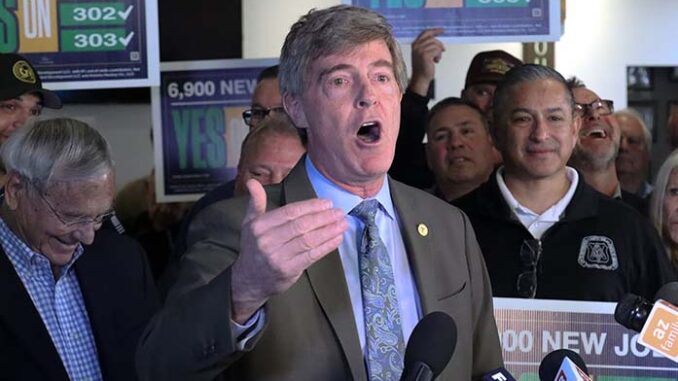
TEMPE – The Arizona Coyotes and other groups in favor of a proposed hockey arena and entertainment district in Tempe urged voters to pass ballot measures in May that would allow the project to proceed.
The Thursday news conference featuring Coyotes players and officials, as well as four former mayors of Tempe, was the first time the public heard from pro-development groups since the city of Phoenix filed a lawsuit Tuesday. The suit alleges the city of Tempe broke a contract when it advanced plans for a residential development near Phoenix Sky Harbor International Airport.
Coyotes President and CEO Xavier Gutierrez said he was “shocked” by the suit, because he thought the city and Sky Harbor had reached a deal.
“You saw the CEO of Sky Harbor get out in front at the Tempe City Council meeting and acknowledge that they were no longer opposed to this,” Gutierrez said of a Nov. 29 special city council meeting. “We as an organization took them at their word, and we were completely shocked that they reversed course.”
Former Tempe Mayor Hugh Hallman on Thursday called the lawsuit a political stunt.
“The basis for the lawsuit is nonsense,” he said.
(Video by Madison Perales/Cronkite News)
The lawsuit filed by the city of Phoenix centers around the building of multifamily housing in areas near the airport that are affected by flight noise. The 1994 agreement limits how close residences can be to the airport but makes exceptions for soundproof apartments.
But Hallman pointed to a 2013 letter from the city of Phoenix about a different development. In that letter, Hallman said, Phoenix said the 1994 document does allow multifamily housing in the noise-affected areas.
Throughout the press conference, Hallman insisted that the proposed development was in line with the 1994 agreement.
“Let me give you some advice, Sky Harbor, the letter agreement was not an amendment to the IGA (intergovernmental agreement),” Hallman said.
That does not appear to be the airport’s reading of the agreement. A page dedicated to the agreement on the Sky Harbor website says: “Including multifamily housing in the Tempe Entertainment District development would place up to 2,100 residential units in a high-noise area directly under two converging flight paths – and in a location where Tempe and Phoenix agreed there would be no housing.”
Phoenix Director of Aviation Services Chad Makovsky said in a statement released Thursday morning ahead of the Tempe news conference that he understood the developer’s frustration but that it should be aimed at the city of Tempe.
“We thought we had a reasonable compromise with Tempe that would protect the airport, the communities around the airport and allow these developments to proceed,” the statement said.
RELATED STORY: David and Goliath: PACs go head-to-head before Tempe special election for Coyotes arena
Opposition groups were there Thursday, and former Tempe Councilmember Lauren Kuby, a prominent opponent of the project, said after the event that the blame for any rancor over the deal should be laid at the feet of Bluebird Development, which is owned by Coyotes majority owner Alex Meruelo.
“What’s clear is that this developer brings division wherever he goes,” Kuby said. “You can look at Glendale, you can look at Tucson, you can look at Miami Beach, there are so many instances where he sparks division.”
Late last year, the Tempe City Council agreed to send three propositions to voters this May to create a Coyotes Entertainment District. It would include 2,000 apartments, a new 16,000-seat hockey arena and a complete entertainment district with businesses and gambling hubs on more than 45 acres of city-owned land west of Tempe Town Lake on Priest Drive and Rio Salado Parkway.
Proposition 301 would amend the city’s General Plan 2024 Land Use Map to facilitate the redevelopment of the city-owned, but commercially zoned, property into a mixed-use project that would allow an entertainment district with retail, restaurant, hotel, office and residential uses. Proposition 302 would rezone the city property, and Proposition 303 would uphold Tempe’s decision to authorize Mayor Corey Woods to sign off on a development and disposition agreement with Meruelo’s Bluebird Development LLC.
Despite the lawsuit, Gutierrez was confident the measures on the May 16 special election ballot will pass and that the development will proceed.
“This is a fight between Tempe and Phoenix. We don’t believe that the voters and residents of Tempe should allow the city of Phoenix to bully them,” Gutierrez said. “We are moving forward, and we are hoping that the voters will vote yes on propositions 301, 302 and 303.”
Cronkite News reporter Piper Hansen contributed to this story.
